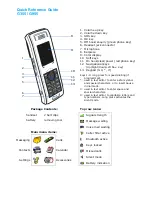
68 - Warnings and precautions
storage, and distribution areas; chemical plants; or where blasting
operations are in progress. Areas with a potentially explosive
atmospheres are often, but not always, clearly marked. They include
below deck on boats, chemical transfer or storage facilities, vehicles
using liquefied petroleum gas (such as propane or butane), and areas
where the air contains chemicals or particles such as grain, dust or
metal powders.
Follow any restrictions. Do not use the device where blasting is in
progress.
Emergency calls
If certain features are in use, you may first need to turn those features
off before you can make an emergency call. Consult this guide or your
service provider for more information.
When making an emergency call, give all the necessary information
as accurately as possible. Your wireless device may be the only
means of communication at the scene of an accident. Do not end the
call until given permission to do so.
Taking care of your smartphone
1.
DO
take care not to scratch the screen of your smartphone. Keep
the screen clean. When working with your smartphone, use your
finger or fingernail. Never use an actual pen or pencil or other sharp
object on the screen surface.
2.
DO NOT
expose your smartphone to rain or moisture. Do not let
water enter the circuitry through the front panel buttons or expansion
slots. In general, treat your smartphone as you would a mobile
smartphone or other small electronic device.
Important
Wireless smartphones, including this device, operate using radio
signals, wireless networks, landline networks, and user-programmed
functions. Because of this, connections in all conditions cannot be
guaranteed. You should never rely solely on any wireless device for
essential communications like medical emergencies.
Summary of Contents for liquid
Page 1: ...User s Manual ...








































